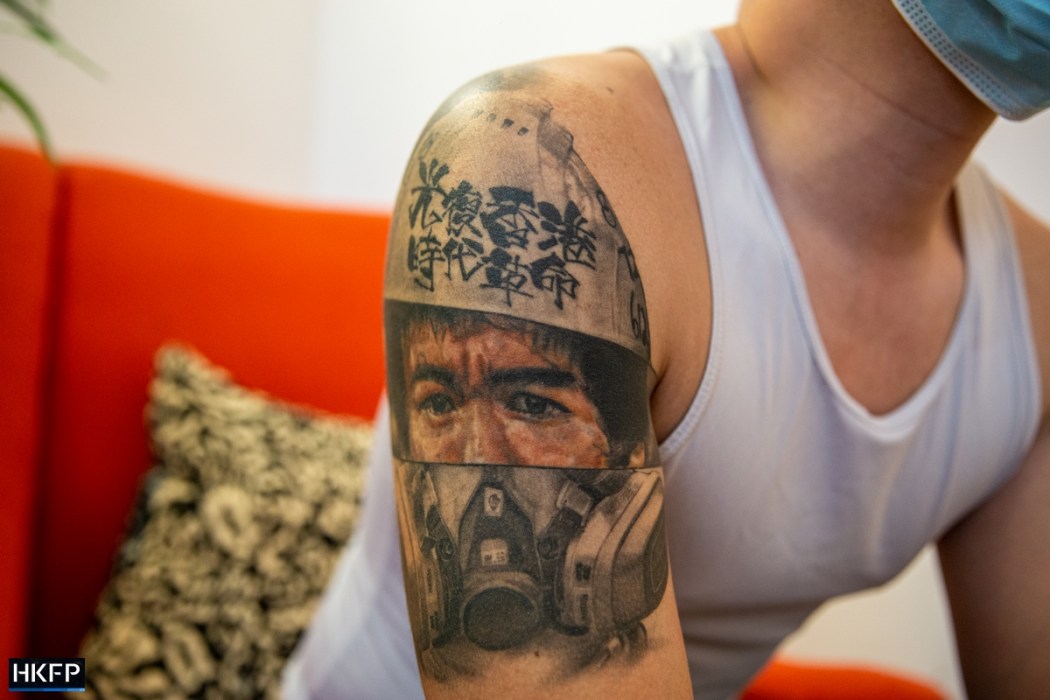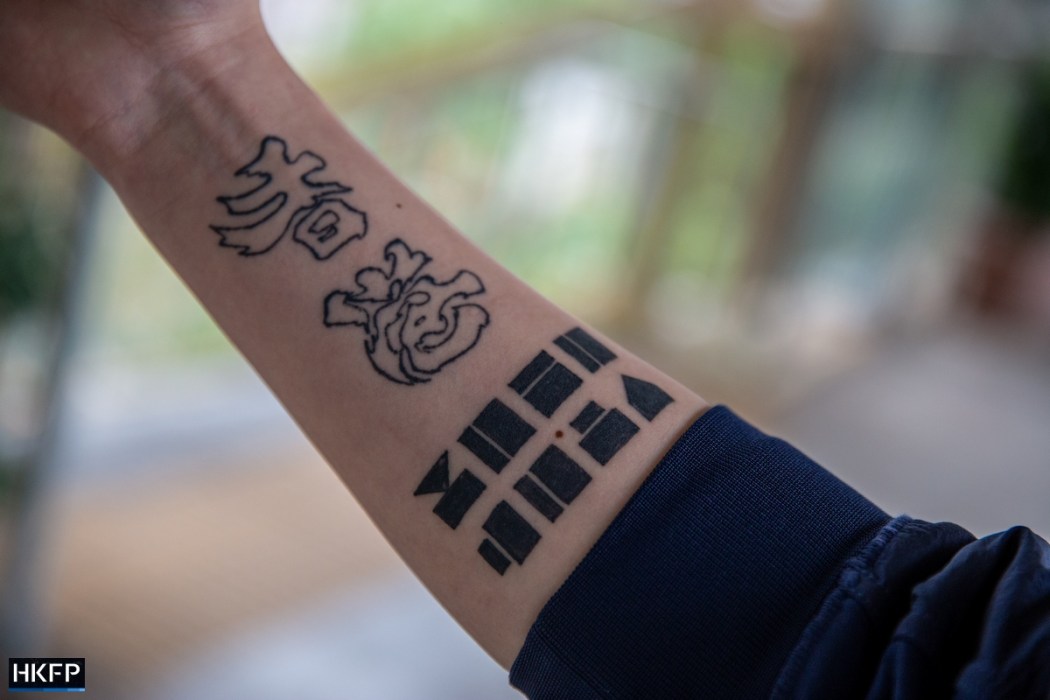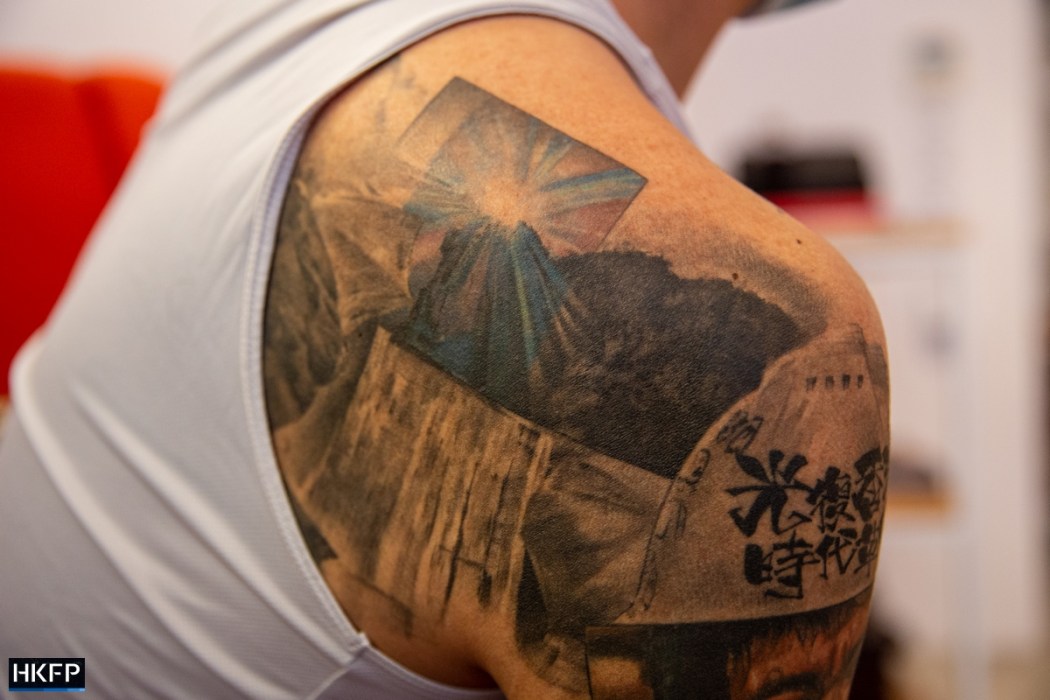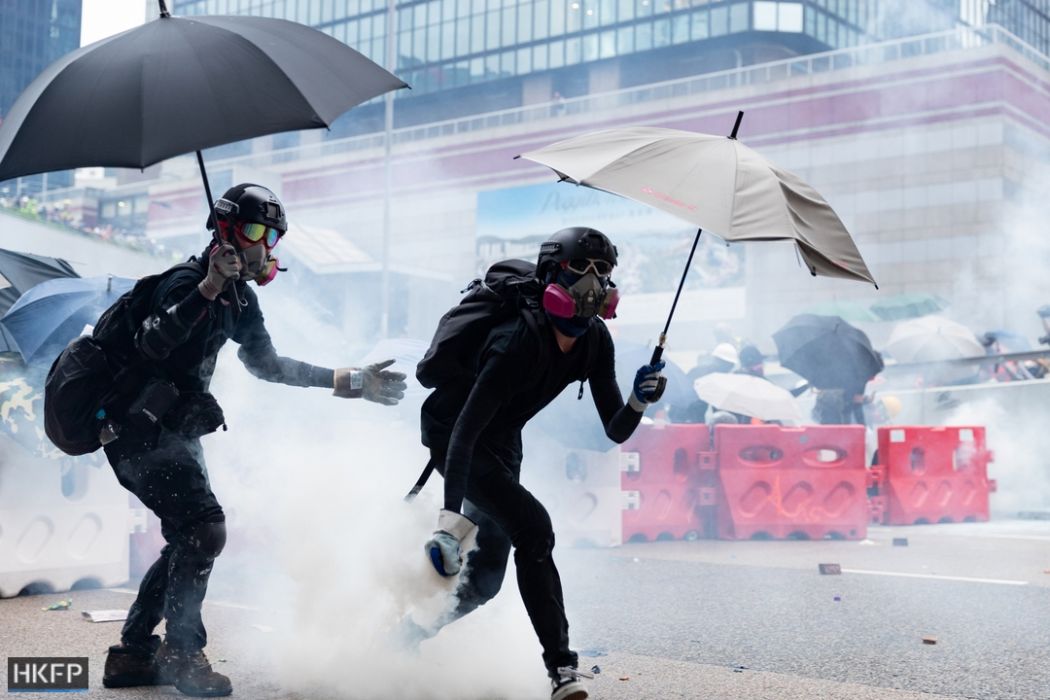Hong Kong pro-democracy protesters Eugene and Hong are determined to keep their tattoos depicting the now-illegal slogan “Liberate Hong Kong, revolution of our times.” They see their skin as the “last inch of freedom” remaining under the Beijing-enacted national security law.
When Eugene carefully takes off his hoodie, a striking tattoo featuring the slogan and a man in a helmet and respirator is unveiled on his right shoulder. The eight Chinese characters – frequently chanted during the 2019 anti-extradition bill protests – have become highly sensitive since the Hong Kong government described the phrase last July as secessionist, subversive and pro-independence.

The activist, who asked to be identified by his first name only, says he was well-aware of the risk of getting such a tattoo even back in October 2019, when the city was gripped by violent clashes between police and protesters.
He became more vigilant after the sweeping security legislation was passed last June, with his friends urging to avoid wearing tank tops which will show the inked slogan: “I’m scared of going to jail… but if I was arrested and charged for this tattoo, I wouldn’t mind, [In order] to let other people know that Hong Kong has deteriorated to this stage,” he said.
The controversial law – described as “draconian” by its critics – criminalises secession, subversion, collusion with foreign forces and terrorist acts. The four offences are punishable by life imprisonment, with dozens arrested since its enactment.

Another protester, who only wished to be named as Hong, reveals the eight-character slogan tattooed in an geometric form on his right forearm. The design originated from local netizens who came up with alternative ways to express the illegal phrase. The obfuscated rectangles and triangles subtly represent the strokes of the Chinese characters.
The 28-year-old tells HKFP the enactment of the national security law triggered his “act of rebellion” in having the slogan permanently etched on his body since he sees no room for free speech under the new legislation.
“You may be arrested for putting up a sticker, waving a flag or wearing a keychain. In the end, all you can do is tattoo it on your body… your skin is actually the last inch of freedom,” he said.
Like Eugene, Hong is worried about breaching the law, but says the government may not go after people with protest-related tattoos just yet. He also questions what the authorities can do if they put these individuals behind bars.

“Let’s assume they put me in jail, what can they do? Will they cover up my tattoo or remove it? I don’t think… I think if that’s the case, then let them do it,” Hong said.
In response to HKFP‘s enquiries, the Security Bureau said the legislation has “clearly prescribed” and “narrowly defined” the four categories of national security offences.
“Whether a defendant is guilty or not would depend on relevant evidence, and ultimately be determined by the court, having regard to the facts and circumstances of the case,” it said.
Apart from the sensitive slogan, Eugene’s back serves as a canvas for iconic scenes from the months-long political and social unrest. He takes inspirations from news photos, including an image of people gathered on top of the symbolic Lion Rock to shine lights in solidarity with the protesters.
The sizable tattoos took more than six hours to complete and he felt his skin was on fire. But the activist was willing to tolerate the pain, describing the process as “redemption” and a tribute to the “frontline comrades” arrested by police.
“Tattooing is like a ritual… for me, it is a comfort emotionally. Under some circumstances, I couldn’t help the [protesters], but I endured this pain to remember them. To let them know that people won’t forget them,” he says.

Eugene reveals that another reason for getting a unique tattoo was related to unverified rumours that some deaths during the 2019 demonstrations could have involved foul play. The man in his mid-30s says he hopes the tattoos will make him recognisable if anything happens to him.
Hong, on the other hand, says his first protest-related tattoo, which is an ambigram combining the Chinese characters for “Hong Kong” and “Add oil,” was intended as proof he was not an undercover police officer.
He explains he was often a target of people at protest scenes “catching ghosts” – uncovering police officers disguised as black-clad demonstrators and wearing face masks. The body art usually settled any doubts about his sympathies, Hong says, but some would still be sceptical about his identity.
Hong recalls his involvement in the 79-day Umbrella Movement of 2014 which saw thousands of pro-democracy protesters occupying main streets to demand universal suffrage in electing the chief executive.

Asked why he did not get a tattoo about the Occupy protests six years ago, Hong says there was still considerable latitude to speak his mind at the time. “Back then, I didn’t feel like there was no going back. The environment at the time didn’t push me to [get a tattoo]. I thought I still had many other ways to express myself.”
Tattoo artist Lau Kwan, who has been in the industry for six years, says political designs were less popular in 2014. He describes Hongkongers as “becoming more bold” over the past year, with at least two to three customers visiting him monthly for tattoos featuring a protest image or protective gear.
Following the enactment of the national security law, however, Lau says he has only etched protest-themed designs on two people. The resident artist at Lazy Bones Tattoo reckons some people may fear unwanted attention on the street.

“I have a feeling that the spots where people got their [protest-related] tattoos are receding… maybe they want to stay out of trouble,” he says.
Another tattoo professional, Wang of Friday’s Tattoo, tells HKFP that his customers opted for less explicit designs about democracy and freedom – such as the Lady Liberty statue – amid fears over the security legislation. Many tattoo artists like Wang had to come up with new designs while retaining the messages their customer intended to convey.
“Usually people want to remember [the protests] for the rest of their lives. It’ is not a trend or a way to accessorise oneself. It is for documenting what happened and passing it on to the next generation,” the 34-year-old says.
Wang’s colleague Felix Kan, 34, says he warned young customers against designs containing the “Liberate” slogan before it was even banned, citing uncertainty about a shifting red line.

“If the design is too straightforward, we don’t know what will happen in the future,” he says.
The Causeway Bay-based shop regularly shares examples of its tattoo work on social media. Artist Jamie Kam admits they have been rebuked by pro-Beijing or pro-government individuals, who warned them they may be arrested sooner or later for protest-related designs.
Even so, Kam, Kan and Wang remain unfazed, saying tattoo artists cannot worry too much and they will always find space to get their message across safely.
“If [the authorities] want to get you, there are many ways. For our part, we are trying to convey the message without letting them get to us,” 37-year-old Kam says.

Kan adds: “Tattoo artists always find ways, creative ways, to keep this going until the moment they say that tattoos are not allowed. Then, there would be nothing we can do.”
Protester Hong says he plans to get more tattoos about the city and its fight for democracy, but may have to wait until parlours are allowed to reopen when the Covid-19 pandemic is under control.
Eugene is also considering altering his original plan to cover most of his back with protest-themed tattoos. The activist says he may replace some images with local street scenes to help remember the city, as he is considering resettling in the UK, US or Canada in three years’ time.

“I can’t see any hope, I’m very disheartened… my roots are in Hong Kong and I want to save this place, but other people are not awakened yet. They still have hope that the authorities will be reasonable. I think they are too naive,” he says.
Fellow activist Hong, despite feeling greatly discouraged after the failure of the 2014 civil disobedience movement, is less downcast this time.
“I see more and more hope. The impact of the [2019 protests] was far-reaching. As long as people, our next generation, know what is happening, then there is hope.”
Support HKFP | Policies & Ethics | Error/typo? | Contact Us | Newsletter | Transparency & Annual Report | Apps
Help safeguard press freedom & keep HKFP free for all readers by supporting our team
























